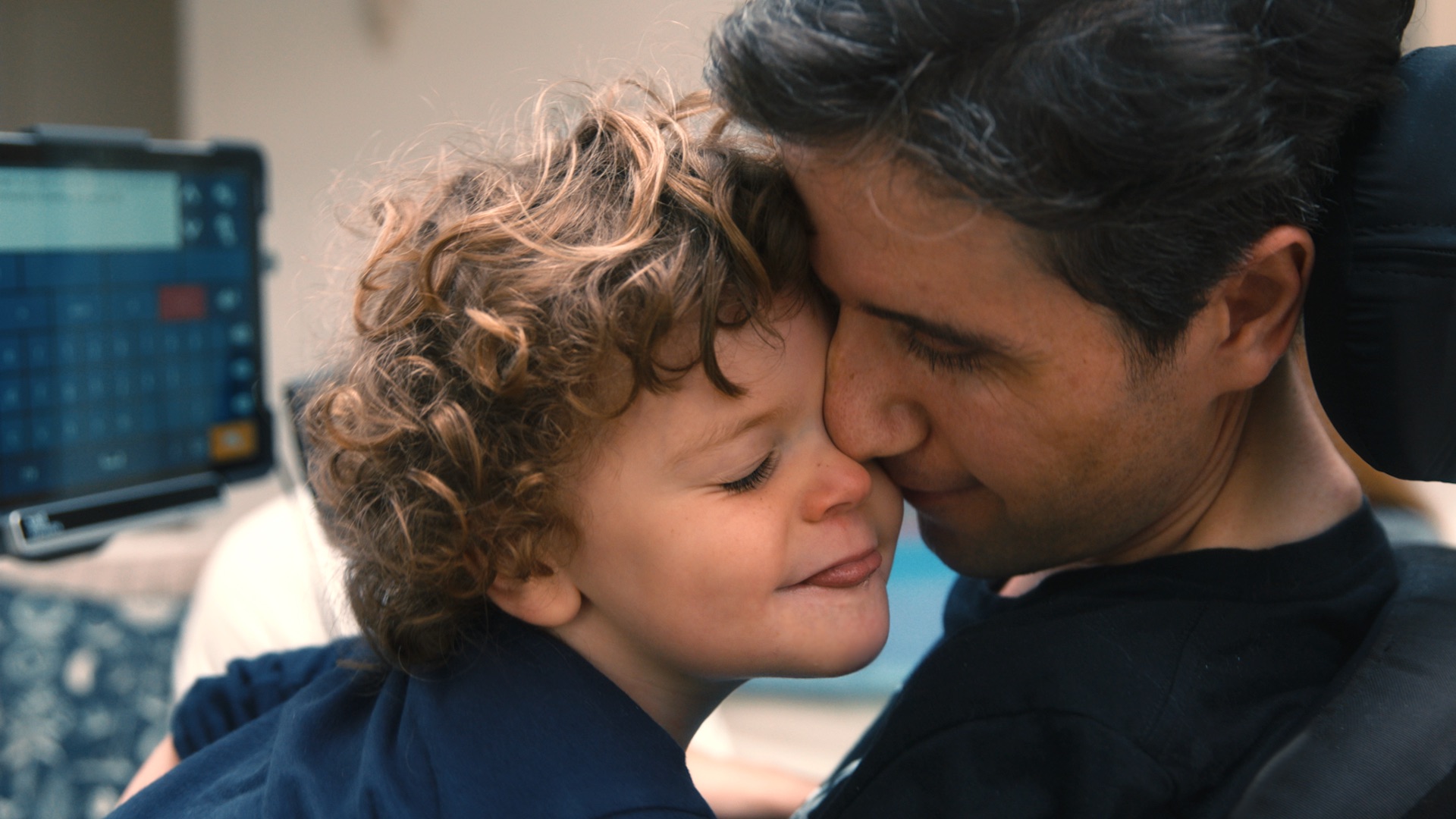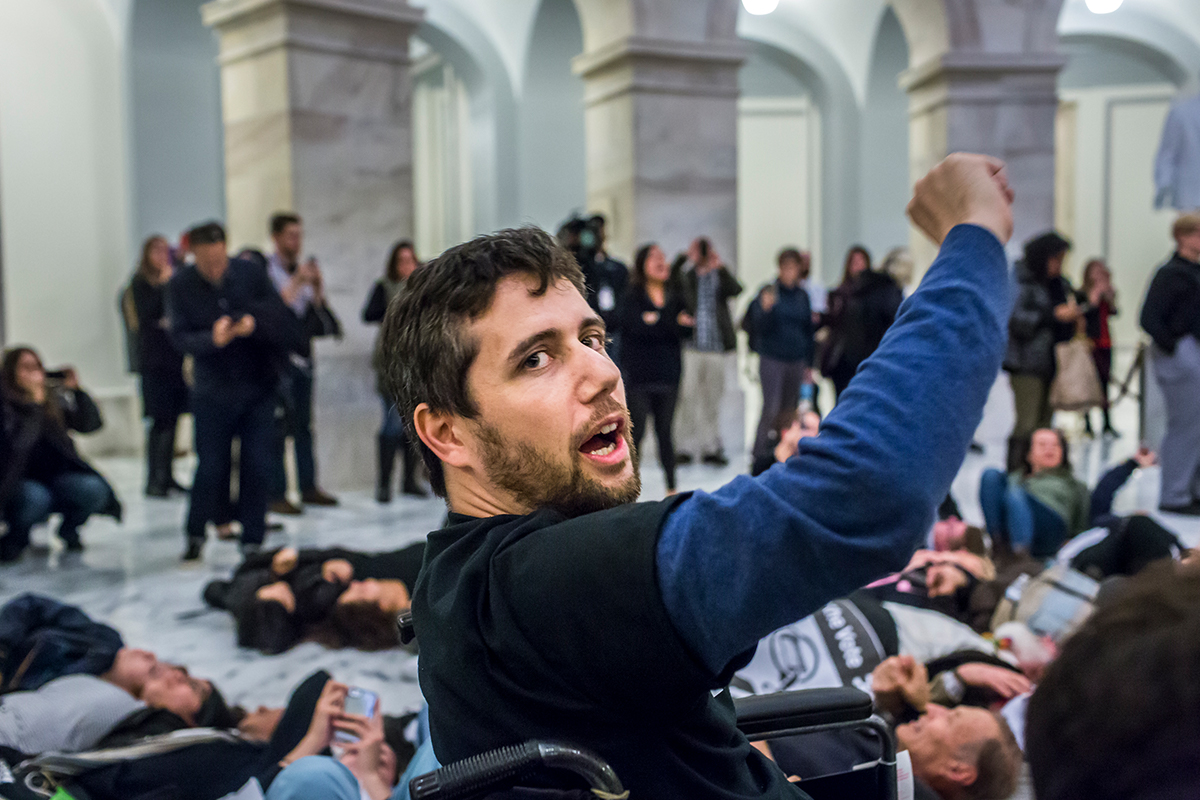The first image of “Not Going Quietly,” a new documentary by Nicholas Bruckman, shows Jewish activist Ady Barkan on D.C.’s national mall. Flanked by his partner in organizing, Liz Jaff, he advances towards the Capitol, where he will soon testify at the first-ever Congressional hearing on Medicare for All. In his motorized wheelchair, he steadily approaches the building’s famous, looming steps. This opening wordlessly previews the story of the film: how this man chooses to persist in the face of huge national — and personal — obstacles.
“Not Going Quietly” introduces its audience to Ady, now 37, a charismatic activist and lawyer who was diagnosed with ALS in 2016 shortly after the birth of his first child, Carl. Ady first captured national attention in 2017, when he confronted Senator Jeff Flake on a plane in an attempt to save the Affordable Care Act; the video went viral. The film centers around two major moments of activism: the national “Be a Hero” tour Ady undertook in 2018 to talk about healthcare in advance of the midterm elections, and his 2019 testimony at the Medicare for All hearing. But more than a political piece, it’s a portrait of a man who was, in many ways, prescient about the crises that would befall our country.
By the time Ady spoke to Congress in 2019, he had lost the use of his natural voice, relying on eye-tracking technology to speak. Early on, the documentary includes footage of Ady when he could move and talk freely; he’s advocating for low-income Americans as part of the Fed Up campaign, and getting married, and smiling most of the time. He’s charming, articulate, full of energy, handsome. Though Ady never sought public office, I couldn’t help but think of another young rising political star who’s also Jewish and who also married his school sweetheart: Senator Jon Ossoff of Georgia.
On the heels of the personal tragedy of his diagnosis, Ady received another crushing blow: the election of President Trump. As a progressive activist, what would you do if you learned that Trump’s presidential term could span the last years of your life?
At first, understandably, Ady focused on his family. But as he confronted the realities of his illness, he couldn’t turn off his activist lens. The deterioration ALS causes ultimately leaves those who suffer from it unable to breathe on their own; Ady was exploring the realities of a ventilator a few years before the entire world developed a COVID obsession with the machines. And they weren’t cheap. “The knowledge that I was dying was terrible,” he quips in voiceover, “but dealing with my insurance company was worse.” He had already known that America’s healthcare system was broken — now he was “experiencing its brokenness personally for the first time.”
That chance encounter with Liz Jaff (whom he met in the airport) and Jeff Flake showed him how powerful a platform his new situation provided. As he says, the quieter his physical voice became, the louder his message could resonate. In Ady’s words, “movement-building is invigorating for me. It allows me to transcend my body and be part of something bigger than myself.” He’s been able to have an enormous impact: “Not Going Quietly” documents an appearance with Bernie Sanders, who hugs and thanks him when they meet, and a sit-down with Jake Kolten, another young father-to-be suffering from ALS.
But this comes at a personal cost: Every moment spent organizing was a moment away from his family. Because ALS is rapidly degenerative, even a few weeks meant a significant change in Ady’s functioning. The contrast between Ady and his son is too much at times, the roles reversed. At one point, Carl brings a snack towards Ady’s mouth in a sort of child-to-parent “airplane.” When Ady takes a while to answer a question Carl asks him, Carl praises his father when he finally does reply: “You’re learning how to talk, good for you!” As Carl gains vocabulary — FaceTiming his dad on the road, babbling happily about pasta puttanesca — Ady loses his. The one time Ady breaks down onscreen, he’s talking about Carl, grieving because he won’t be able to watch him grow up.
Though there’s no question that his disease presents a painful reality, “Not Going Quietly” is also full of moments of disabled joy, many of them connected to family: Ady holding Carl on his lap when he was still able to speak, teaching him to identify flowers through the window. “Do you see bougainvillea?” he asks Carl, who calls him “Abba.” Ady’s huge grin and easy laughter never leave him, and neither do his quick wit and personality. He jokes about doing an interview shirtless as his wife Rachael changes his shirt for him on camera. Asked what the last message he’d convey in his natural voice is, he says, without missing a beat, “Peace out, motherfuckers.”

Over the course of the months the documentary captures, Ady crosses the country, meets other people struggling with healthcare, and writes a memoir; by the documentary’s end, he and Rachael have a second child, a daughter. It’s obvious that his disease doesn’t rob him of his humanity, and it doesn’t mean that he can’t live a full life. Just seeing him live makes his argument as well as any speech.
Even when Ady was healthy, he was already listening to the needs of historically neglected Americans. At the Center for Popular Democracy, he championed the Fed Up campaign in response to the recession of 2008, pushing the federal reserve to contribute to wage growth and examining racial income disparities long before the events of 2020 pushed them into the national spotlight. Watching “Not Going Quietly,” it feels like Ady was, again, somehow a few years ahead of the mainstream. He understood that fighting for Black and brown lives was fighting for everyone; then, he was forced to understand that a health crisis could strike anyone at any time.
As America begins to emerge from the grip of the pandemic, the nation has the breathing room to address COVID’s long-haulers, and to grapple with the enormous number of people suffering long-term disabilities after infection. Most of us now know someone whose life has been profoundly changed by a public health crisis. Maybe this global catastrophe will teach more people what Ady preaches: that healthcare is a fundamental right, and that we’ll all need it someday.
Find out where to watch “Not Going Quietly” here.



